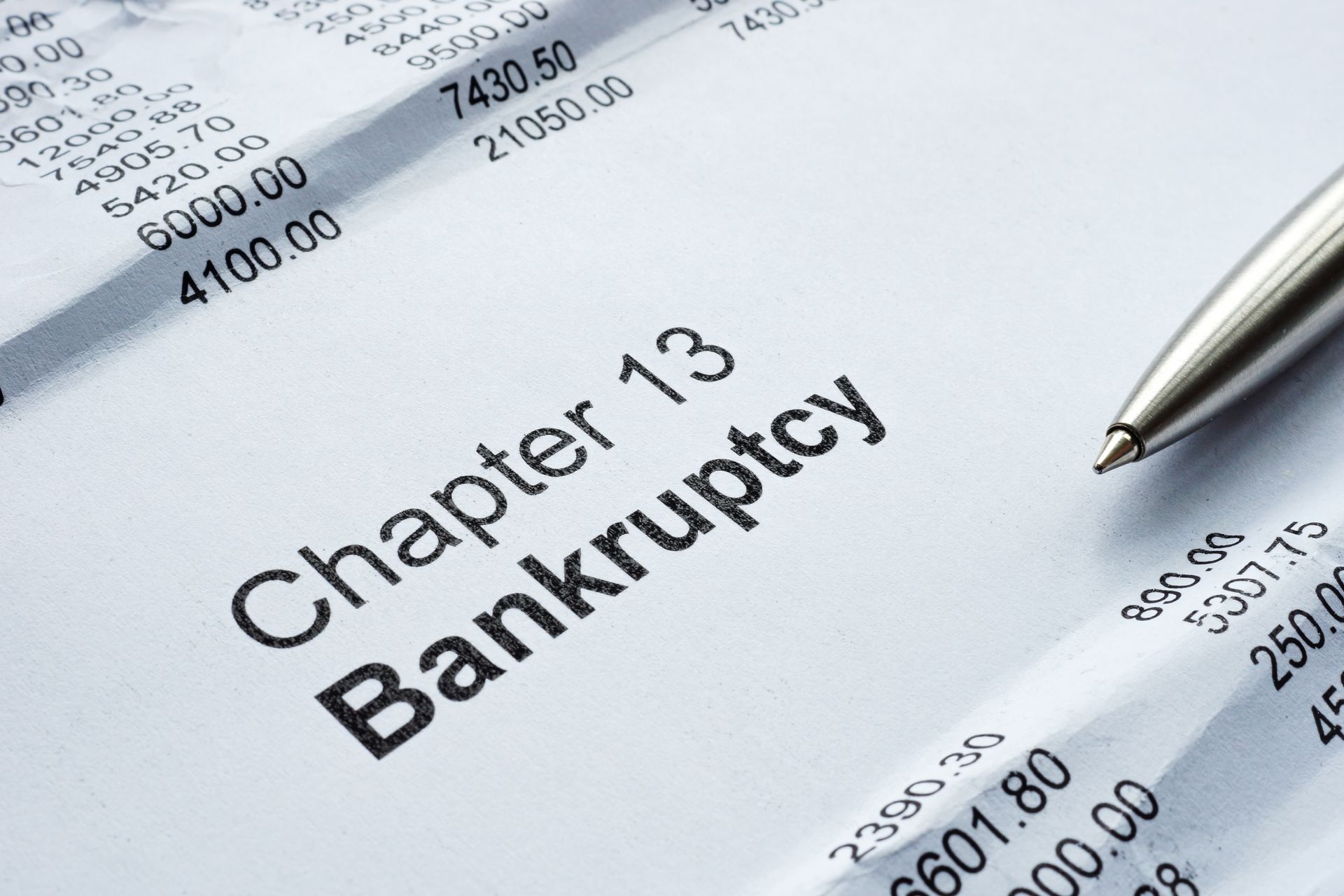Chapter 13 Bankruptcy in New York: What You Need to Know
This is a subtitle for your new post

When debt becomes overwhelming, Chapter 13 bankruptcy can offer individuals and families in New York a lifeline to regain control of their finances. Known as the "wage earner's plan," Chapter 13 allows individuals with a regular income to create a manageable repayment plan to pay back a portion or all of their debts over time. Unlike Chapter 7 bankruptcy, which involves liquidating assets, Chapter 13 enables individuals to protect their property and create a pathway to financial stability.
At J. Singer Law Group PLLC, we understand the complexities of Chapter 13 bankruptcy in New York and are dedicated to helping individuals find solutions tailored to their unique financial situations. This guide will walk you through the essentials of Chapter 13, including who qualifies, how it works, and its benefits.
What is Chapter 13 Bankruptcy?
Chapter 13 bankruptcy is designed for individuals with a steady income who need a structured way to manage their debt. When you file for Chapter 13, you propose a repayment plan to pay off your debts over three to five years. This plan allows you to catch up on past-due debts, reduce the total owed, and even discharge certain unsecured debts at the end of the repayment period.
Chapter 13 vs. Chapter 7 Bankruptcy
While Chapter 7 is often faster, it involves liquidating assets to pay creditors. In contrast, Chapter 13 allows you to retain your property, making it an ideal option for individuals who own significant assets, such as a home or car, and want to avoid foreclosure or repossession. Additionally, Chapter 13 is available to those who may not qualify for Chapter 7 due to higher income.
The Benefits of Chapter 13 Bankruptcy in New York
If you’re considering Chapter 13 in New York, it’s essential to understand the advantages it can provide:
1. Preventing Foreclosure
One of the primary benefits of Chapter 13 is the ability to stop foreclosure proceedings. If you’ve fallen behind on mortgage payments, Chapter 13 allows you to include these arrears in your repayment plan, giving you a chance to catch up while keeping your home.
2. Consolidating Debts into One Payment
Chapter 13 consolidates all your debts into one monthly payment, which you make to a court-appointed trustee who distributes the funds to your creditors. This simplifies the repayment process and ensures you stay on track with payments.
3. Protecting Your Property
Unlike Chapter 7, which may require you to sell certain assets, Chapter 13 allows you to retain your property as long as you adhere to your repayment plan. This can be especially important for individuals with valuable assets or those concerned about preserving their home and other possessions.
4. Discharging Some Unsecured Debts
Once you complete your Chapter 13 repayment plan, certain eligible unsecured debts—such as credit card balances, medical bills, and personal loans—may be discharged. This means you’re no longer responsible for repaying those debts, providing a fresh start at the end of the plan.
Who Qualifies for Chapter 13 Bankruptcy in New York?
To qualify for Chapter 13 bankruptcy, you must meet specific requirements, including:
1. Regular Income
You’ll need a reliable source of income to make monthly payments under a Chapter 13 plan. This income can come from various sources, including wages, Social Security, pension benefits, or self-employment.
2. Debt Limits
Chapter 13 bankruptcy has debt limits for both secured and unsecured debts. As of 2024, your total secured debts must be less than $1,596,875, and your total unsecured debts must be less than $478,975. If your debts exceed these limits, you may need to explore other bankruptcy options, such as Chapter 11.
3. Up-to-Date Tax Filings
Before filing for Chapter 13, you must have filed your federal and state income tax returns for the previous four years. Failure to meet this requirement can delay or complicate the filing process.
4. No Recent Bankruptcy Discharges
If you have previously filed for Chapter 13 or Chapter 7 bankruptcy, you’ll need to wait a specific amount of time before filing again. Typically, you must wait two years after a Chapter 13 discharge or four years after a Chapter 7 discharge to file a new Chapter 13 case.
How Chapter 13 Bankruptcy Works in New York
The Chapter 13 bankruptcy process involves several key steps, each designed to provide debt relief and a clear pathway to financial recovery. Here’s a breakdown of the process:
1. Filing the Petition
Your attorney will file a Chapter 13 petition with the bankruptcy court, along with detailed documentation about your debts, income, expenses, and assets. This paperwork is essential to demonstrate your financial situation and create a feasible repayment plan.
2. Automatic Stay
Upon filing, an automatic stay goes into effect, halting all collection actions by creditors. This means that foreclosure proceedings, wage garnishments, and creditor harassment must stop immediately, offering relief from the pressure of debt collection.
3. Creating a Repayment Plan
With your attorney’s assistance, you’ll develop a repayment plan, which outlines how you’ll repay your debts over the next three to five years. The amount you pay each month will depend on your income, expenses, and debt amount. Your plan will prioritize secured debts (such as mortgage or car payments) and priority debts (such as taxes or child support).
4. Court Confirmation
The repayment plan must be approved by the court at a confirmation hearing. During this hearing, creditors have an opportunity to raise objections, but once the court confirms the plan, both you and your creditors are legally bound by its terms.
5. Making Payments
Once your plan is confirmed, you’ll begin making monthly payments to the bankruptcy trustee, who will distribute the funds to your creditors. Payments are typically made directly from your income, and the length of your plan will depend on your income level (three years for below-median income, five years for above-median income).
6. Discharge of Remaining Debt
At the end of the repayment period, any remaining eligible unsecured debts included in your plan are discharged, meaning you are no longer legally obligated to pay them. This discharge provides a fresh start, freeing you from outstanding debts and offering a chance to rebuild your finances.
Common Misconceptions About Chapter 13 Bankruptcy
There are several myths about Chapter 13 bankruptcy that can discourage individuals from considering this option. Here are a few common misconceptions:
1. “I’ll Lose My Home in Chapter 13”
In fact, Chapter 13 is often the best option for individuals who want to protect their homes. Including past-due mortgage payments in your repayment plan allows you to avoid foreclosure and keep your property.
2. “I’ll Have to Repay All My Debts”
While Chapter 13 does involve a repayment plan, you may not be required to repay all of your debts. Depending on your income and the type of debt, you may only need to repay a portion, with any remaining eligible debts discharged at the end of the plan.
3. “Chapter 13 Will Ruin My Credit Forever”
While Chapter 13 will impact your credit, it can actually provide a structured way to address debt, which may be more favorable in the long run than continuing to struggle with unmanageable debt. Many individuals can begin improving their credit score during or after completing the repayment plan.
How J. Singer Law Group PLLC Can Help with Chapter 13 Bankruptcy in New York
Filing for Chapter 13 bankruptcy can be complex, but the experienced attorneys at J. Singer Law Group PLLC are here to guide you through every step. Here’s how we can assist you:
1. Assessing Your Financial Situation
We’ll work with you to evaluate your financial circumstances and determine whether Chapter 13 is the best solution for you. We’ll provide insights into how bankruptcy can impact your future and how to make the most of your repayment plan.
2. Crafting a Repayment Plan
Our attorneys will help you create a feasible repayment plan that fits within your budget while meeting the court’s requirements. We aim to make the process as manageable as possible, allowing you to keep essential assets and reduce debt over time.
3. Representing You in Court
From the initial filing to the confirmation hearing, we’ll represent you in all court proceedings, advocating for your interests and ensuring that your rights are protected. We’ll address any objections raised by creditors and work to achieve a favorable outcome.
4. Providing Ongoing Support
Throughout the repayment period, we’ll be here to answer your questions, provide guidance, and address any issues that arise. Our goal is to help you complete your Chapter 13 plan successfully and move forward with financial confidence.
Conclusion: Is Chapter 13 Bankruptcy Right for You?
Chapter 13 bankruptcy offers a structured way to manage debt while protecting your assets. For individuals and families in New York facing overwhelming debt, Chapter 13 can provide relief from creditor actions, a clear repayment plan, and a fresh financial start.
At J. Singer Law Group PLLC, we’re dedicated to helping our clients find effective debt solutions and achieve long-term financial stability. Contact us today for a free consultation, and let us help you determine if Chapter 13 bankruptcy is the right option for your situation.











